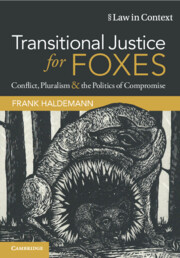3 - Pluralism
Published online by Cambridge University Press: 24 November 2022
Summary
This chapter offers a pluralist reading of transitional justice built around three meanings of pluralism. The first is value pluralism – the idea, dear to Isaiah Berlin, that values are irreducibly manifold, potential conflicting and frequently incommensurable in such a way that they cannot be ranked or weighed on any single scale. The second meaning of pluralism is cultural pluralism. It refers to the fact that there are many different cultures, many different collective ways of life, none of which can claim superiority. While insisting on the possibility of a cross-cultural conversation around core values, the proposed pluralist approach rejects the normal model’s tendency to reduce transitional justice to one set of (Western) cultural forms. The third form of pluralism briefly considered is legal pluralism, meaning the coexistence of competing legal orders. Discussing Rwanda’s experience with the so-called gacaca courts, the chapter suggests a pluralist understanding of the rule of law flexible enough to accommodate cultural variation while remaining committed to what I take to be its universal core. The chapter ends by proposing a pluralist method for thinking about transitional justice, which is linked to basic commitments referred to as sense of reality, anti-monism, situated thinking, decolonised cosmopolitanism and fallibilistic mentality. The chapter argues that these commitments can help mitigate a number of problematic trends in contemporary transitional justice discourse and practice.
Keywords
- Type
- Chapter
- Information
- Transitional Justice for FoxesConflict, Pluralism and the Politics of Compromise, pp. 95 - 145Publisher: Cambridge University PressPrint publication year: 2022

